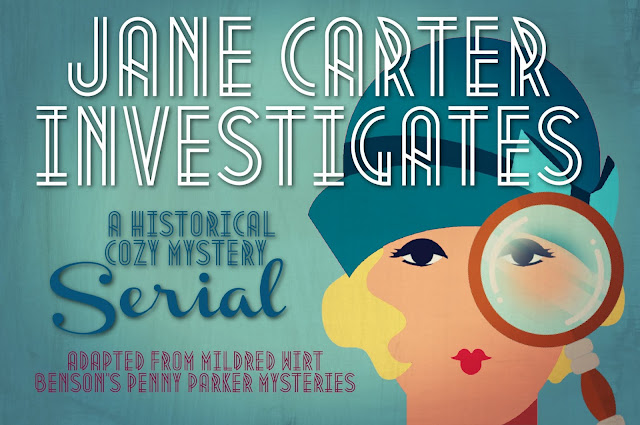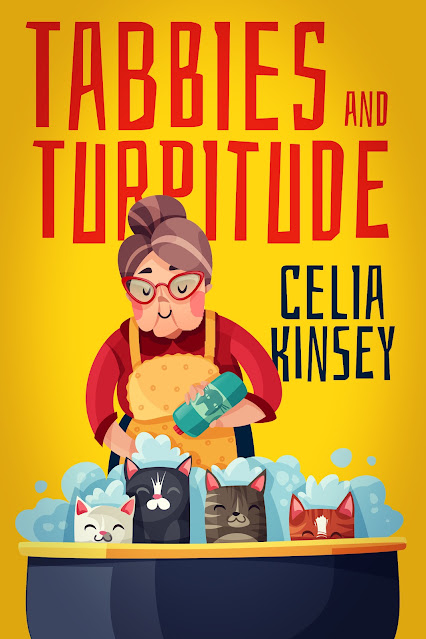Jane Carter Investigates Episode One-Hundred and Eight
“I don’t see anything remotely
inflammatory about urging women to exercise their right to vote!” I said
frostily.
“It’s not that I don’t support suffrage
for women,” my father amended hastily,” but it’s just that Mr. Philip Dunst has
forbidden me from accepting the advertisements proposed by his wife on pain of
losing his entire account. What’s more, I’m forbidden to let on to Mrs. Dunst
that he’s made any such threat.”
“I’m disappointed in you, Dad,” I said,
and I meant it. “I thought you were a man of pure principle. Just how big is
this account of Mr. Dunst’s?”
“It’s beginning to feel like he owns a
stake in half the retail establishments in Greenville,” my father said. “If
Philip Dunst were to withdraw all advertising for every business he has an
interest in, it would account for over a third of our advertising income.”
“Oh.”
I was beginning to see why Dad was
having difficulty sticking to his principles.
The cab drew up at our front door. A
light still burned in the living room where Mrs. Timms, our housekeeper, sat
reading a magazine.
“I am glad you have come, Jane,” she
said, switching on another light. “I was beginning to worry.”
Mrs. Timms may not be my mother, but
she certainly worries about me as if she were. Mrs. Timms has been a widow for
as long as I can remember, and it’s long been a cherished dream of mine that
she and my father will light a fire under a pot together, and perhaps, one of
these days, center-aisle it to the altar together to say, “I do.”
From time to time, I dare to hope that
the water is at least approaching a tepid simmer, but every time I catch a
little glance between them or find out they’ve gone off some place together,
they strenuously deny there’s anything in the nature of a rumpus-bumpus going
on between them.
Mrs. Timms’ main hobby is cookery.
Because her sister, Henrietta, has a husband in the diplomatic service, we are
often served dishes harking from the Indian subcontinent, at least until the
contents of Henrietta’s periodic care-packages shipped straight from Calcutta
give out.
Unfortunately, my father has a
sensitive stomach lining, and curries are pure poison to him. However, since
I’ve been forbidden to whisper a word of his condition to Mrs. Timms, I’m
certain Dad entertains feelings for Mrs. Timms which go well beyond ordinary
friendship. It takes more than loyalty and gratitude to acclimate a man with a
sensitive stomach lining to curry on a thrice-weekly basis.
Mrs. Timms soon went to bed, leaving my
father and me to explore the refrigerator. As we helped themselves to deviled
eggs flavored with turmeric and cumin, celery sticks and the remains of an
excellent chocolate cake, I told Dad about the light which I had seen in the
third story window of the abandoned Morning Press building.
“It may have been a watchman making his
usual rounds,” Dad suggested.
“Jack tells me the building has no
watchman.”
“Could it have been a reflection from a
car headlight?”
“I don’t think so, Dad.”
“Well, I shouldn’t lose sleep over it.
Better run along to bed now.”
I woke late the next morning. I ate a
leisurely breakfast alone in the kitchen. I felt at loose ends. Since
“Evangeline: The Horse Thief’s Unwilling Fiancée” had wound its way to its most
unsatisfying conclusion, I did not know how to occupy my time. I could work on
a novella to send out on speculation to competitors of Pittman’s All-story, but I lacked the will. I could submit any of
the half-dozen completed serials—previously rejected by Mr. Pittman for various
reasons—which lay clipped together in my nightstand drawer to other magazines,
but my usual enthusiasm for providing light serial fiction for the masses was
on the wane that morning.
I wandered the house, picking up
objects at random, putting them down again and occasionally dropping things
until I shattered a favorite china dog of Mrs. Timms’, and she begged me to
stop marauding through the house “leaving a swath of destruction in my wake.”
I lay on the davenport and stared at
the ceiling until the telephone rang, and I was summoned to the receiver by
Mrs. Timms.
I half-hoped it was Jack. Jack used to
call up a few times a week and ask me to go to the pictures, or for a stroll in
the park or to split a sundae with him at the local ice cream parlor. But ever
since he’d almost kissed me, I’d taken to turning down all invitations from
Jack Bancroft—save those which included a crowd. I could not afford to be alone
with Jack. If I were alone with him, it might lead to kissing. I would not
allow myself to kiss Jack Bancroft. Jack was the sort of man who’d rapidly move
from kissing to proposals of marriage, and I was not sure I could bring myself
to break his heart by turning him down.
“It’s Harold Amhurst on the telephone,”
Mrs. Timms said, “Now you be nice to that young man!”
“I’m always nice to Mr. Amhurst,” I
said. “As nice as one can be to an insufferable bore.”
Harold Amhurst is a young man of my
acquaintance who, despite my repeated attempts to hand him the icy mitt,
persists in proffering invitations to play tennis with him.
I enjoy the odd game of tennis, at least I do
when I’m playing with Flo or Jack, but Mr. Amhurst has this annoying habit of
doing far more talking than playing. His pet hobby is investment schemes—and
they are never sound—which he insists on explaining to me in excruciating
detail.
After going to the telephone and
pleading a headache to Harold Amhurst, I returned to the davenport and resumed
my spiritual communion with the living room ceiling. I’d been there another
half hour when Mrs. Timms came in.
“Jane, are you ill?” Mrs. Timms asked.
“No, that line about having a headache
was just a ploy to let that gangly unfortunate down easy.”
“Oh? Must you really refer to Mr.
Amhurst as a gangly unfortunate?”
“Well, he is. I know you value
scrupulous honesty, but surely even you can see the merits of me not telling
Harold Amhurst that I refused to play tennis with him because I didn’t want to
spend the afternoon receiving an education on the comparative merits of gold
matriculated amalgamative certificates vs. silver cantilevered multi-leveraged
optimized shares or some such rot. I made that up just as an example because I
never bother to listen to the sordid details of his ill-fated get-rich-quick
schemes.”
“I only asked if you were ill because
you’ve been lying on that couch for the past two hours.”
“I’m in conference with myself,” I told
Mrs. Timms. “I am trying to arrive at a momentous decision.”
For three quarters of an hour, I
scribbled figures on a sheet of paper. When my father came home at five
o’clock, he found me still engaged in scribbling.
“Well, Jane,” he said, hanging up his
hat, “how did it go today? Make any progress on that new novella of yours?
‘Rosemary’s Retrograde Renegade,’ was it?
“Rosalind’s Refulgent Revenge,” I said.
Apparently, I’m not the only one who
doesn’t listen.
“Refulgent?”
“Refulgent: brilliant, shining,
splendid. From the Latin verb fulgere.”
“I see. Make any progress on
‘Rosalind’s Refulgent Revenge’ while I was out?”
“If you don’t mind, let’s discuss a
less painful subject. Suppose you tell me what you know about Marcus Roberts
and the Morning Press.”
“Why this sudden display of interest?”
“Oh, I saw Mr. Roberts last night at the
Bean Pot. He looked rather depressed.”
Dad sat down on the arm of the
davenport.
“It’s too bad about Roberts,” he said.
“I always admired him because he was a clever newspaperman.”
“Clever? Didn’t he mismanage the paper
so that it had to close?”
“Not that anyone ever learned. No, I
never could figure out why Roberts quit. The Press had a large
circulation and plenty of advertisers.”
“What became of the building?”
“It’s still there.”
“No, I mean who owns it,” I explained.
“Not Mr. Roberts?”
“The building was taken over a few
months ago by a man named George Vaughn. Come to think of it, I once brought
him home with me. You should remember him, Jane.”
“I do. He was rather nice. I wonder
what he plans to do with the Press building and its equipment.”
“Hold it for speculation, I assume. In my opinion, he’ll have it empty for a long while.”



Comments
Post a Comment